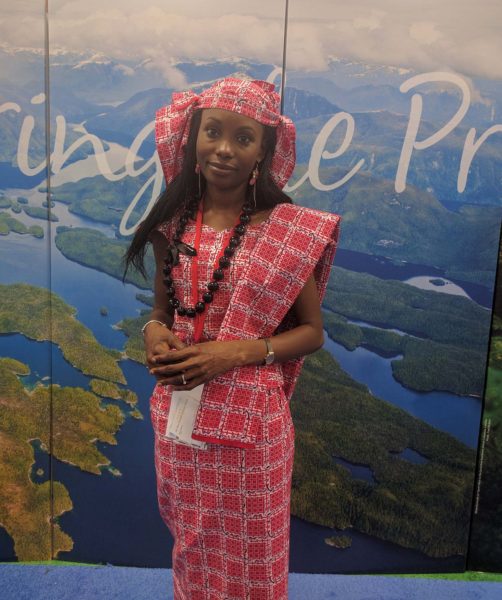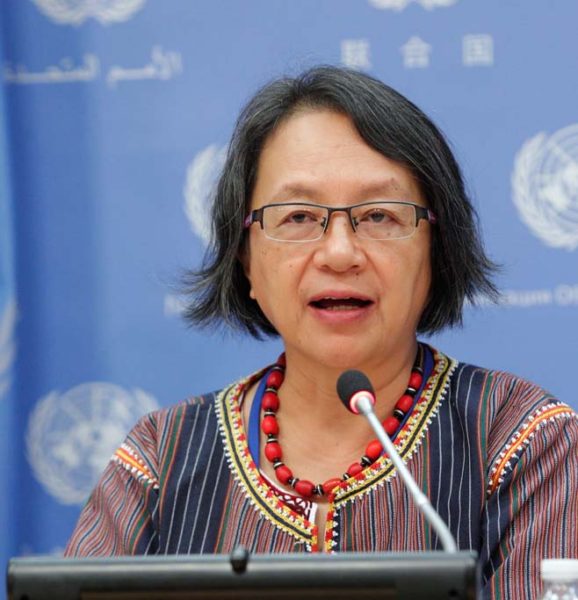Hindou Oumarou Ibrahim knew a man killed for daring to enter a protected area. The killers were allegedly government forces, the man, a tribesman of the Mbororo people of Chad, Central Africa.
“There is a big conflict between the community and the government people because for the community, they do not understand why they stop them to go there and for the authorities, they say ‘no, you don’t have right to come there’ so then sometimes, people get in because you cannot close a protected area with a wall or something so when they get in, they get into conflict and they fight between themselves,” she told Stabroek News in an interview at the recent IUCN World Conservation Congress in Hawaii.
Such conflicts occur in varying degrees in countries around the world, with the rights of indigenous peoples taking second place to conservation, though research has shown that indigenous peoples who live in those areas are better stewards of the land and resources than outside organisations.
This was highlighted by United Nations Special Rapporteur on the Rights of Indigenous Peoples, Victoria Tauli-Corpuz during a forum at the World Conservation Congress here on Saturday.

The UN official said her predecessors had repeatedly received well-founded complaints of gross human rights violations of indigenous peoples connected with conservation activities, particularly with the establishment and management of parks and protected areas. Among the violations continuing today, Tauli-Corpuz said, are the rights to lands, territories and resources including total dispossession of land.
“This is something that has been happening in the past but it continues up to the present and even recently, I have been receiving reports of displacements of indigenous peoples in several countries in Africa as well as in Asia,” she told the gathering.
It is a problem experienced by Ibrahim and her people, who inhabit the Sahel region in Chad. “We are protecting the environment by duty because it is giving us our food, our medicine, our livelihood for our survival so we don’t need to make a project to conserve the environment but we are conserving very naturally,” she said. “For us, it’s for our life.”
However, the government and some organisations undertake conservation projects and force the indigenous peoples from the protected area, she said. The Mbororo are a pastoral community and their restriction from protected areas mean that they cannot graze their animals in those areas, creating conflict that sometimes spill into violence.
“There are many parks created there and the guard of park stop my people, the pastoral community (from going) into the park and graze. So then it’s in conflict with our livelihood, with our identity, then it’s not respecting the environment because it’s dividing these biodiversity,” she said.
Because of the restrictions, violent clashes have occurred now and again. “There is conflict where they fight and they kill each other and is becoming a tragedy but no one can talk about it because government is powerful,” Ibrahim said. She spoke of the case where the man was killed. He was shot, she said.
Meantime, the UN Special Rapporteur highlighted several other violations such as the rights to resources, including access to traditionally used resources which impacts on livelihoods and increases poverty and dependency.
Despite efforts by the conservation community to ensure conservation using a human rights approach, much remains to be done for the full respect of indigenous peoples’ rights in the context of conservation, she said. Tauli-Corpuz pointed to various human rights treaties and conventions and emphasised that these are applicable to indigenous peoples as well.

She highlighted a number of challenges including that conservation is still state-centred despite performing poorly in this area. She also pointed out that globally, indigenous peoples’ rights to their lands and resources are not adequately recognised or protected. Violations are continuing regardless of the existence of national legislative recognition of indigenous rights and commitments to do better by the conservation community, she declared.
She also said that the conservation views and practices of the past, which excluded indigenous peoples and local communities, still linger in many legal and administrative measures related to conservation. “The legacy of dispossession due to past practices have not been addressed, and the remedies have not been provided. Grievance mechanisms are very much lacking and redress has not been provided in any satisfactory manner,” the UN official declared.
Tauli-Corpuz highlighted that the establishment of protected areas is still done without adequate consultation and the free, prior and informed consent of indigenous peoples affected. She emphasised that although the legal obligation to consult rests with the State, conservation actors should make sure that such obligation has been adequately complied with before initiating any activity affecting indigenous peoples’ rights.
According to Tauli-Corpuz, while forced displacement for conservation activities has reportedly diminished in recent years, indigenous peoples are denied access to their resources and thus deprived of their livelihoods and cultural and spiritual rights, which may force them to abandon their territories. Violence is still used in many cases against indigenous communities whose territories have been gazetted as conservation lands, she said highlighted beatings, arrests and burning of houses in recent times.
She also pointed out that in many countries, there is a clear inconsistency between the environmental legislation and measures and the legal instruments recognizing the rights of indigenous peoples, usually to the detriment of the latter.
“In many countries, indigenous peoples’ identities and rights are still denied by the State. And even in countries where legislation exists, the implementation is very poor and indigenous land and resources rights remain unprotected,” Tauli-Corpuz said.
She identified several opportunities for better respect of rights. According to Tauli-Corpuz, indigenous peoples have expressed the need to count on the conservation community as allies to confront the unsustainable exploitation and grabbing of their lands and resources. She added that joint initiatives developed with the consent of indigenous peoples are rendering good conservation results while respecting human rights. Further, she said, the effective implementation of the commitments already adopted can operationalize the human rights based conservation paradigm.
She emphasised that States, conservation non-governmental organisations (NGOs) and other actors involved in conservation activities have obligations to meet to change the situation on the ground and the new approach to a human rights based conservation has to be translated from paper to practice on the ground. “The full recognition of indigenous land rights and participation are key enabling conditions for conservation to be sustained,” she declared.
The UN rapporteur made a number of recommendations to States including to effectively implement international conventions relating to the rights of indigenous peoples, ensure that a rights-based approach is applied to the creation or expansion of existing protected areas, and ensure free, prior and informed consent of indigenous peoples before the development of conservation activities which may affect their rights. She also urged States to establish accountability and reparation mechanisms for infringements on indigenous rights in the context of conservation and provide redress for historical and contemporary wrongs.
In terms of NGOs, she recommended that they respect and support the rights of indigenous peoples as recognised in international human rights law and enhance their ability to engage in conservation by advocating for recognition of their collective rights. Among other things, she also urged the NGOs to ensure that culturally appropriate complaints mechanisms are available for indigenous peoples to voice their concerns over conservation initiatives and support initiatives for indigenous peoples’ right to remedy in cases when conservation activities have negatively impacted their rights.
For donors, Tauli-Corpuz urged them to require that conservation organisations adopt human rights policies and monitor the application of human rights-based conservation programmes, notably in relation to indigenous peoples’ rights. She also recommended that they provide direct funding to better support indigenous peoples’ own initiatives for conservation.
“I hope many of these recommendations will be taken into account in the final resolution or recommendations that will emerge from this World Conservation Congress,” she said. The UN official said she believes that indigenous peoples will provide some of the solutions to the environmental crisis and it is the task of the dominant society is to strengthen their capacity to contributing solutions and to ensure they will continue to enhance the biological and cultural diversity of the planet.
For Ibrahim, the Congress was an opportunity to share some of the experiences in her country. “It is continuous, the violation of these rights,” she said.
Natives are also arrested, jailed and fined, she pointed out. But the issue is more than about a protected area, it is about life, she said, when asked whether she feared for her life given some of the deadly incidents.
“If you are fighting for these issue, either you take the risk and you see the reality and you fight and you go or either you shut up and you stay but I choose to…it has to stop and someone need to say it,” she declared.




